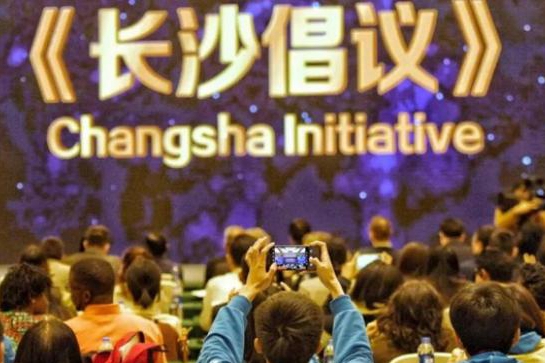Changsha Initiative adopted in China by youths from 86 countries
On April 3, 125 young participants from 86 countries discussed and passed the Changsha Initiative in Changsha, capital city of China's Hunan province, during the third International Youth Forum on Creativity and Heritage along the Silk Roads.
On April 3, 125 young participants from 86 countries discussed and passed the Changsha Initiative in Changsha, capital city of China's Hunan province, during the third International Youth Forum on Creativity and Heritage along the Silk Roads (IYF3).

The initiative is an action-oriented outcome document highlighting 10 concrete recommendations under an umbrella of three key areas: creativity and innovation, youth space for mutual learning and exchanging, and capacity building.
It also encompasses three consensuses: young women and men are the living force of creativity and innovation; young women and men are beneficiaries of and contributors to exchange and mutual learning; young people with capacities and skills are better dream-chasers and contributors to a better world in this new era.
After the Changsha Initiative was adopted, Russell Rivoallan, head of Social and Human Sciences UNESCO Beijing, thanked the participants for their dedication. He said, "The IYF3 could thrive as a living network of international like-minded individuals who, in the spirit of the Silk Roads, continue to build bridges, share knowledge, ideas and cultures; the IYF3 is a genuine representation of a 21st Century Silk Roads."
During the capacity-building forum, young participants had the opportunity to learn from one another in the spirit of intercultural dialogue and a celebration of cultural diversity to engage, to explore the capacity of culture, innovation and the creative industries, to achieve sustainable development through the safeguarding of cultural heritage and social integration.
"The IYF is not your typical youth forum," said Marielza Oliveira, UNESCO representative and director of the UNESCO Office in Beijing during the opening ceremony. "We will not tell you that 'youth are the future.' We will not 'empower' you. We will not ask you to 'become' agents of change. Our starting point is our real belief that young people are changing the world right now, and a certainty that you will continue to take this leadership role in the years to come."
Throughout the event, young entrepreneurs, youth leaders, municipal, national and international governmental officials from the cultural and creative industries were able to experience first-hand how youth can promote economic development and social progress, and to see how contributing to innovation, creativity and heritage protection can drive sustainable economic development and encourage socio-cultural awareness and understanding.

